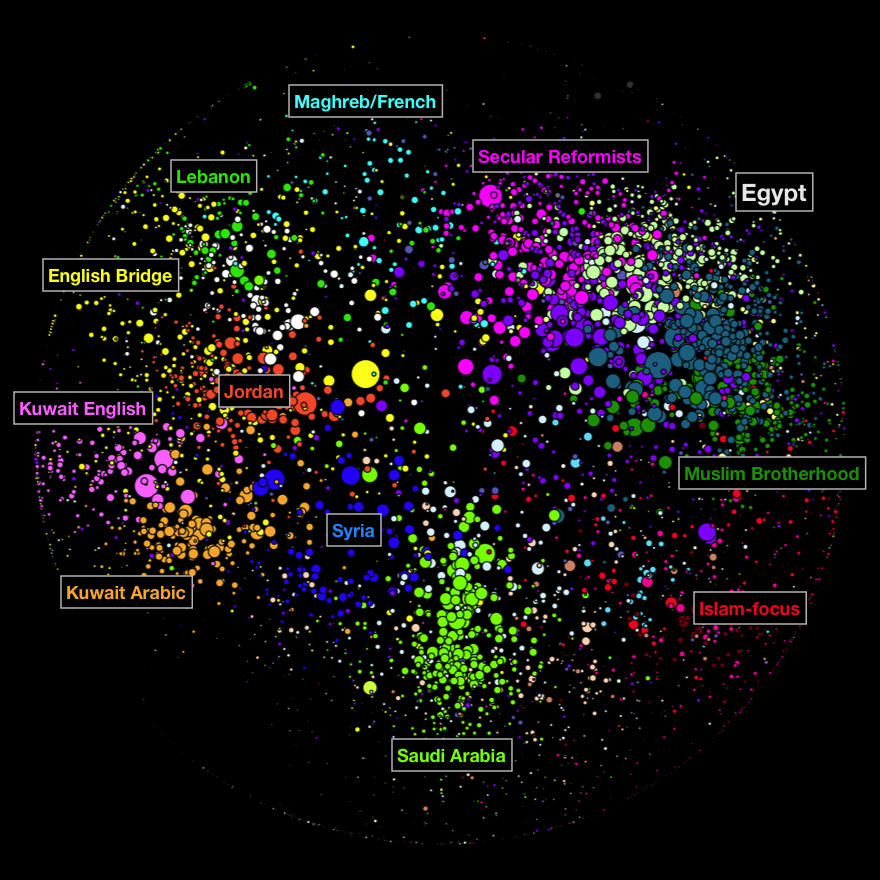Philip N. Howard: The Digital Origins of Dictatorship and Democracy: Information Technology and Political Islam (2010)
Filed under book | Tags: · 1990s, 2000s, censorship, democracy, internet, iran, islam, politics, technology

– First book to move beyond potential and hypothetical relationships between technology diffusion and democratic transitions to look at lived experiences for countries under study
– Draws on a statistical study that compares data trends across 74 Muslim countries between 1990 and 2008
– Addresses 2009 presidential elections in Iran
Around the developing world, political leaders face a dilemma: the very information and communication technologies that boost economic fortunes also undermine power structures. Globally, one in ten internet users is a Muslim living in a populous Muslim community. In these countries, young people are developing their political identities–including a transnational Muslim identity–online. In countries where political parties are illegal, the internet is the only infrastructure for democratic discourse. In others, digital technologies such as mobile phones and the internet have given key actors an information infrastructure that is independent of the state. And in countries with large Muslim communities, mobile phones and the internet are helping civil society build systems of political communication independent of the state and beyond easy manipulation by cultural or religious elites.
This book looks at the role that communications technologies play in advancing democratic transitions in Muslim countries. As such, its central question is whether technology holds the potential to substantially enhance democracy. Certainly, no democratic transition has occurred solely because of the internet. But, as Philip Howard argues, no democratic transition can occur today without the internet. According to Howard, the major (and perhaps only meaningful) forum for civic debate in most Muslim countries today is online. Activists both within diasporic communities and within authoritarian states, including Iran, Saudi Arabia and Pakistan, are the drivers of this debate, which centers around issues such as the interpretation of Islamic texts, gender roles, and security issues. Drawing upon material from interviews with telecommunications policy makers and activists in Azerbaijan, Egypt, Tajikistan and Tanzania and a comparative study of 74 countries with large Muslim populations, Howard demonstrates that these forums have been the means to organize activist movements that have lead to successful democratic insurgencies.
Publisher Oxford University Press, 2010
ISBN 0199736413, 9780199736416
285 pages
review (Evgeny Morozov)
PDF (updated on 2012-11-11)
Comment (0)Mapping the Arabic Blogosphere: Politics, Culture and Dissent (2009)
Filed under report | Tags: · blogging, culture, egypt, human rights, internet, islam, middle east, networks, politics, religion
“We conducted a study of the Arabic language blogosphere using link analysis, term frequency analysis, and human coding of individual blogs. We identified a base network of approximately 35,000 active blogs, created a network map of the 6,000 most connected blogs, and with a team of Arabic speakers hand coded 4,000 blogs. The goal for the study was to produce a baseline assessment of the networked public sphere in the Arab Middle East, and its relationship to a range of emergent issues, including politics, media, religion, culture, and international affairs.”
Authored by Bruce Etling, John Kelly, Rob Faris, John Palfrey, Internet and Democracy
Published by Berkman Center, June 2009
Internet & Democracy Case Study Series
Berkman Center Research Publication No. 2009-06
62 pages
CyberOrient: Online Journal of the Virtual Middle East, Vol. 5, Nr. 1 (2011)
Filed under journal | Tags: · activism, internet, islam, middle east, politics, public sphere, social media, technology

“The main purpose of this electronic journal is to provide a forum to explore cyberspace both as an imaginary forum in which only representation exists and as a technology that is fundamentally altering human interaction and communication. The next generation will take e-mail, websites and instant availability via cell-phones as basic human rights. Internet cafes may someday rival fast-food restaurants and no doubt will profitably merge together in due time. Yet, despite the advances in communication technology real people in the part of the world once called an “Orient” are still the victims of stereotypes and prejudicial reporting. Their world is getting more and more wired, so cyberspace becomes the latest battleground for the hearts and minds of people everywhere.”
Editor-in-Chief: Daniel Martin Varisco
Publisher: Middle East Section of the American Anthropological Association and the Faculty of Arts of Charles University in Prague
ISSN 1804-3194
View online (HTML articles)
Comment (0)

